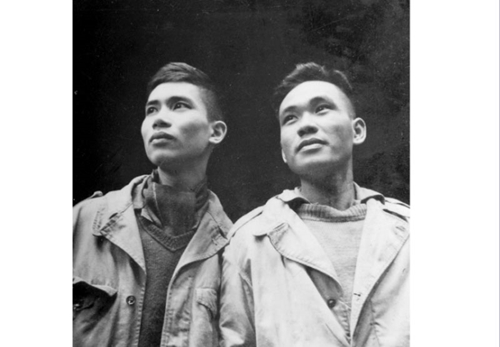Major General, journalist Tran Cong Man (1925-1998) was a former Editor-in-Chief of the People's Army Newspaper (PAN) in the 1979-1989 period, a former Permanent Vice President (Permanent Deputy Secretary General) of the Vietnam Journalists’ Association in the 1990-1994 period. Lt. Gen., Assoc. Prof., Dr. Nguyen Dinh Uoc (1927-2010) was a former PAN Editor-in-Chief in the 1974-1978 period, and former Director of the Institute of Military History in the 1994-1999 period.
    |
 |
|
Nguyen Dinh Uoc (right) and Tran Cong Man in 1954 |
Tran Cong Man was the Political Commissar of Engineering Regiment 151 while Nguyen Dinh Uoc was the Acting Political Commissar of Artillery Regiment 675.
The photo of Nguyen Dinh Uoc and Tran Cong Man was taken in 1954 in Viet Bac (Northernmost region of Vietnam) War Zone, after the historic Dien Bien Phu Victory.
The original photo, small in dimension (5cm x 5cm), has been well preserved. It proves the friendship in combat, and close colleagueship at the PAN of the two men who had the same lifelong ambition to follow the Party.
In October 1964, both men were assigned to the posts of Deputy Editors-in-Chief of the People's Army Newspaper right after the U.S. imperialists waged a destructive war against North Vietnam. Before that, Nguyen Dinh Uoc worked for the People's Army Magazine, now the National Defense Journal, while Tran Cong Man worked at the Division of Political Education and Information under the Army Officer Candidate School.
From 1964 to 1978, they, together with a contingent of dynamic and brave reporters and sub-editors, developed the newspaper into a daily one with higher position and prestige. To catch up with the pace of the war, the newspaper formed groups of reporters, sub-editors, and commentators to promptly cover all battles, from small to big ones to ensure the quality of each issue, such as the Spring 1968 General Offensive and Uprising, the combat to defend the old citadel of Quang Tri - the red summer 1972, the “Dien Bien Phu in the air” Campaign in 1972 in Hanoi and surrounding areas, the Ho Chi Minh Campaign to liberate the South and reunify the country in 1975.
Attentively, in wartime, the newspaper’s staff worked in trenches around the clock. Nguyen Dinh Uoc and Tran Cong Man often came home late after all articles were sent to the printing house for typesetting. They even had many sleepless nights. At that time, the People's Army Newspaper and a number of other newspapers became “fighting flags,” close and trusted friends of readers.
After 1975, along with the mission of disseminating information about military and defense affairs, the newspaper also covered socio-economic fields, national construction and development. The 1975-1978 period was really difficult for Vietnam in general and journalists in particular. It was a period of searching for new directions for the country's press. The PAN was reinforced with university graduates in journalism in the 1970s. Nguyen Dinh Uoc was assigned to a new task. Tran Cong Man took office as the PAN’s Editor-in-Chief as from 1979. Man and the contingent of cadres and reporters built the newspaper into a prestigious one in the renewal process and national construction cause in the 1980s, especially since 1986 when the country started the renewal process. Man successfully completed his duties as a successor.
Nguyen Dinh Uoc and Tran Cong Man were talented generals. For their children and grandchildren and for the younger generations of their colleagues, the great lessons from the two generals, the PAN’s chief editors were the spirit of self-study and aspiration for knowledge, discipline, solidarity among colleagues, and team work in task performance.
Translated by Chung Anh